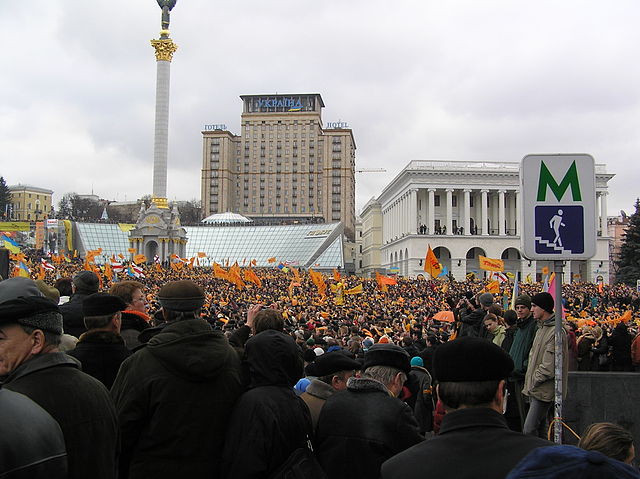Silent Protest

On November 21, 2004, voters in the Ukraine took to the polls to elect a prime minister. The incumbent, Viktor Yanukovych, came in with 15.09 million votes, besting the challenger, Viktor Yushchenko, by fewer than 900,000 votes, or about three percentage points. The election, however, was marked by voter intimidation, potential ballot fraud, and poisoning — somewhere along the way, Yushchenko found himself the victim of dioxin poisoning. As often happens with contested elections, the official announcement came a few days later. On November 24th, the state-run news TV station, UT1, announced the incumbent Yanukovych the winner.
For many reasons, though, this victory wouldn’t stick. Journalists, wanting to be editorially independent from the state mouthpiece, took a more critical view of the vote totals. International observers cried foul. And one of the sparks behind this was a woman named Nataliya Dmytruk, who said nothing.
But what she signed — that’s a different story.
On the evening of the 24th, Dmytruk served as UT1’s sign language interpreter, relaying the information broadcast in a way that the hearing impaired could understand. Like the person reading off the ballot results, Dmytruk was given the official statement — the one which declared Yanukovych in his bid for re-election. But unlike the speaker at the lectern, Dmytruk refused to accept that result. Instead of signing that Yanukovych won, she told what she believed to be the truth. According to the Washington Post, Dmytruk signed “I am addressing everybody who is deaf in the Ukraine. Our president is Victor Yushchenko. Do not trust the results of the central election committee. They are all lies. . . . And I am very ashamed to translate such lies to you. Maybe you will see me again.”
Plenty of people took notice. Most importantly, Dmytruk’s words spread throughout the UT1 newsroom, and 250 of her colleagues stood with her in demanding the ability to report on the news with a balanced approach. UT1 changed to allow for this and soon after, so did competitor broadcaster (also previously a state mouthpiece to a significant degree) Channel 1+1.
While Dmytruk’s influence did not spread much further, her act of defiance was one of the notable ones during this period of political turmoil in the Ukraine. Hundreds of thousands peaceably protested the election results (one such protest seen above) in what is now called the “Orange Revolution.” The Ukrainian Supreme Court overturned the November 21st election results and ordered a re-vote, and on December 26, 2004, Yuschenko defeated the incumbent, 51% to 44%.
As for Dmytruk herself, she survived to sign again — and received multiple accolades along the way. The U.S. National Press Club and the White House each honored her for her bravery and dedication to freedom of the press, as did many others.
Mostly unrelated bonus fact: In ordinal rank, the ace in a deck of playing cards is lower than the two — it’s the one, after all. But in most card games, the ace plays as the high card, trumping the King. Why? According to Wikipedia, this use became popular after the French Revolution, with the ace symbolizing the rise of the commoner over the monarchy.
From the Archives: Rhode Island Revolution: Why the state of Rhode Island once had two governors at the same time (kind of).
Related: “Signing Made Easy,” a paperback which teaches you the basics of American Sign Language. 4.1 stars on 53 reviews.
